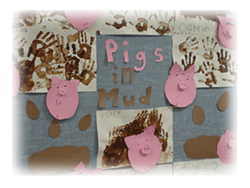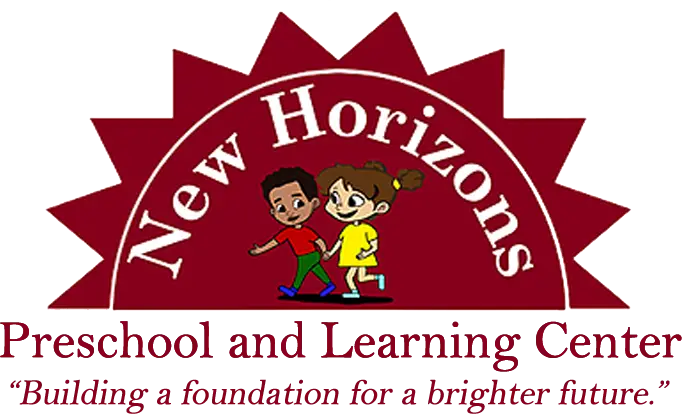PreSchool
“So What’s My Child Doing?”
A parent’s prospectus on the preschool experience at New Horizons
“Shhh! My Dolly is sleeping…”; “Watch out! The bulldozer is knocking it down…”; “I’m making it like it needs a bath…”; A child’s world is filled with expressions of creativity and imagination. These creative activities, once considered mere play are now known to have meaning and purpose. Studies show that children who engaged in lots of creative play are likely to have a larger vocabulary, greater empathy for others, and be more resourceful when left to themselves.

Because play is so much fun, it is often hard for parents to realize that children engaged in play are actually working very hard! Play is a child’s way of taking this complex world of ours and reducing it to manageable proportions that match his or her developmental level of understanding. It is the most concrete and exact means for a young child to assimilate knowledge.
Early childhood educational philosophy has undergone a reevaluation to eliminate the widespread demand for formal teaching techniques and the developmentally inappropriate emphasis on academic achievement based on paper and pencil activities. The research of noted Swiss psychologist, Jean Piaget, offered educators many answers to the puzzling question of how children really learn. A major figure in 20th Century psychology, Piaget was the first to make a systematic study of the acquisition of understanding in children, and he saw the child as constantly creating and recreating his or her own model of reality. Through his work and that of other child development theorists, educators know that children’s thoughts develop from actions and not from oral or written words. This knowledge cannot be given to children, but must be discovered and constructed through the child’s own activities. There is a normal developmental framework within which each child builds knowledge from one state to another. These basic theories overwhelmingly support the value of play and the developmental approach in New Horizon’s preschool setting.
Organization of the preschool environment into centers provides structure and order and offers children many opportunities for making decisions about the kinds of play they would like to engage in. Each of the centers embraces a specific set of objectives that outline the kinds of learning a child may experience. These objectives range from the simple understanding of how to stack the wooden rectangles so they won’t fall down in the block area to the more complex peer negotiation involved in choosing who will be the mother in housekeeping. Centers define space and support the development of more involved levels of play by limiting intrusion and allowing small groups of children to work together. Centers allow teachers to move freely among the children to observe and assist the children in grasping concepts.
Of course, a major goal of the program here at New Horizons is socialization. A group play setting offers unlimited opportunities for children to explore acceptible behaviors and practice social skills that are necessary for getting along well with others. Each and every child is encouraged to wait their turn, to accept and respect routines and rules of the school environment, to use words to ask for something without physically acting out their needs, and to recognize possibilities from another child’s point of view.
The preschool experience is an evolving process that is ongoing from two years of age to Kindergarten. Many of the skills we look forward to your child mastering require repeated exploration and discovery and must be practiced at several developmental levels before a genuine understanding of them is achieved. Our two, three, four and five year olds are all painting, building, counting and keeping house again and again because each age group brings their own set of developmental skills to the activity.
So…what is it your child is doing? He or she is playing their way to a successful future.
Pinellas County Lic. #C950800
Preschool + Parent = Partnership
Home is the first schoolhouse and parents are the first teachers; together we can do the job well.
We believe when parents are involved in their child’s education, it strengthens the continuity between a child’s experiences at home and school
Open Door Policy
You are welcome to visit New Horizons at any time. If you wish to meet with the Director during your visit, it’s a good idea to make an appointment.
Parent Concerns
If you have any questions or concerns, please do not hesitate to discuss them with either the teacher or Director. We welcome the opportunity to work together with you to provide a quality experience for your child.
Parent Volunteers
Participating in the classroom can be a valuable support for your child’s education. Classroom teachers will coordinate parent volunteer time and activities if you are interested in participating with the class.
Communication
Daily Communication. Please check your child’s cubby daily to assure that you receive all messages, art, work, calendars, notices, etc. Please remember that detailed discussions about day events are often difficult during drop-off and pick-up times.
Monthly Newsletters and Calendars. We will provide you with a monthly newsletter that contains general information about upcoming school activities and events. In addition, you will receive a monthly calendar from your child’s teacher that will include specific classroom information.
Parent/Teacher Conferences. We are always available for a parent/teacher conference throughout the year, and we encourage you to keep us advised of any questions you may have. Please feel free to schedule a conference with your child’s teacher at any time.
Formal Parent/Teacher conferences are held in January to discuss goals for each child’s growth and development in age-appropriate skills. All parents will receive a written evaluation for their child at the end of the school year.
Discipline
New Horizons views discipline as a means of helping children become more socialized as they gain self-control and accept the rules of social learning. We provide children with many opportunities to practice expected behavior in order to get along with larger groups of children, a skill that is mastered gradually.
New Horizons strives to discourage all forms of unacceptable behaviour by establishing an appropriate classroom environment and curriculum. We believe that learning early in life to enjoy working and playing with peers is essential to success throughout life. When teacher intervention is necessary to maintain safety and guard the right of others, inappropriate behavior is handled according to a child’s individual needs as follows:
- Positive reinforcement of appropriate behavior
- Redirection to more appropriate behavior
- Removal from situation until ready to re-enter the group
- Parent conference
- Referral to appropriate services if needed
Parents are encouraged to discuss any special needs of their child with the Director and teacher by making an appointment.




